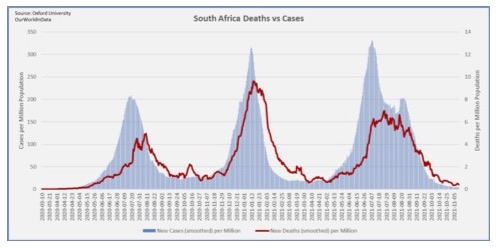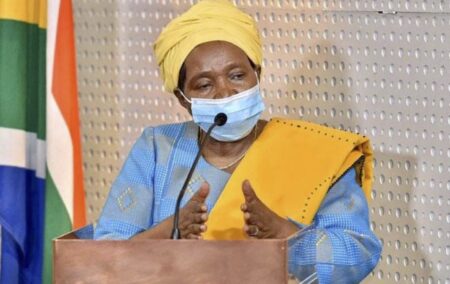Cogta Minister Nkosazana Dlamini-Zuma’s extension of the National State of Disaster to 15 December 2021 is harmful and contrary to the facts, says the Institute of Race Relations (IRR).
The Institute points out in a statement that, for the past month, South Africa’s Covid deaths have been ten times less than they were during the second wave, currently averaging 0.6 deaths per day per million people.
‘This is in contrast to the 6+ deaths per day per million people during the second wave. As the graph below illustrates, South Africa currently has the lowest Covid death and case numbers on record since the peak of the first wave.’

The IRR says that these facts ‘demonstrate that, against the backdrop of critical Covid-19 threats in the past, extending the State of Disaster is not compatible with the current situation’.
‘Indeed, Stats SA data show that overall deaths (not due to Covid) in the last month are currently two orders of magnitude greater than Covid-19 deaths. Attention to these deaths on the part of national legislators is being sidelined by the National Coronavirus Command Council (NCCC) and other “Disaster” deviations from constitutional normalcy.’
IRR head of campaigns Gabriel Crouse said: ‘To call this a State of Disaster is absurd, and only deepens Disaster-fatigue, meaning that if extraordinary measures are required in the future, people will be less likely to take them seriously, as the boy who cried wolf knows but Dlamini-Zuma does not.’
The extension of the National State of Disaster is ‘part of the broader trend of abuse of power by the Cogta Ministry’.
‘This abuse was earlier demonstrated in August 2021 when Dlamini-Zuma attempted to force the postponement of national municipal elections. The Constitutional Court vindicated the IRR’s observation that her proclamation was irrational. Now, as then, the Minister cannot be trusted to terminate executive super-powers when the facts require it, or in the absence of public pressure,’ the IRR says.
The IRR’s attorneys wrote to the Presidency last week to ask whether the NCCC fulfils even the most basic requirements of professional state conduct, including keeping an attendance record and minutes of meetings, and whether decisions were formally voted on. To date the IRR has received no reply to these most basic questions.
Crouse says the extension of the National State of Disaster ‘entrenches the Command Council above, and outside, structures of parliamentary oversight, normalising the idea of South Africa’s people being governed by an inscrutable Command Council’.

